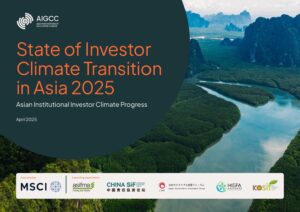India’s institutional investors are showing strong progress in integrating climate into their governance, and in engaging corporates on climate risks and opportunities. They are also increasingly recognising the financial materiality of climate change.
The Asia Investor Group on Climate Change (AIGCC)’s climate metrics assess investors’ performance in managing climate risks and opportunities. The new data covers 15 Indian institutional investors with 101 trillion INR (US$1.2 trillion) in collective AUM.
The data is an exclusive India-focussed extract complementing the sixth edition of the Asia Investor Group on Climate Change (AIGCC)’s annual flagship report, ‘The State of Investor Climate Transition in Asia’, which reviews 230 of the most significant and influential investors across Asia.
AIGCC’s research finds a growing proportion of India’s investors are on par with the overall Asian investor benchmark. The Indian cohort is progressing in several aspects of climate governance and climate corporate engagement, such as:
- Recognition of Climate Risks/Opportunities. This is gradually becoming mainstream investment practice amongst Indian investors as 60% of Indian investors are now recognising the financial materiality of climate change.
- Investment Policies on Climate Integration. 47% of Indian investors have integrated climate considerations into their investment policies. This is near the overall Asia Investor Average of 66%.
- Board-Level Oversight of Climate Change. 53% of Indian investors are integrating climate into their corporate governance oversight.
- Reporting on Voting Decisions. 50% of Indian investors are reporting on voting decisions (vs Overall Asia Investor Average of 39%).
However, AIGCC has identified key areas for Indian investors to prioritise and get more granular in their climate transition journey, including disclosures, climate investment, and policy advocacy:
- Near term climate targets. India’s investors do not yet appear to set near term climate goals (for example, 2030 or 2035 emissions reduction targets). Setting robust interim targets form the basis for investors in order to further develop concrete transition plans and strategies.
- Internal policies on, or approaches to, high-impact areas, including fossil fuels and nature/deforestation. A few of India’s investors appear to have internal climate policies on fossil fuels or other high-emitting sectors but many of them have yet to build this up internally.
- Publication of climate scenario analysis. A few of India’s investors have started to do so but many of them have yet to make disclosing climate scenario analysis results a mainstream practice.
- Transparency and support of climate policies. India’s investors do not yet publicly disclose support or actions relating to climate policy advocacy and related engagements.
AIGCC CEO, Rebecca Mikula-Wright said: “India, with its abundant natural resources and growing economy, is uniquely positioned to lead the transition away from fossil fuels and towards renewable options. The increasing cost-competitiveness and scalability of renewables present a compelling case for this shift in India.
“We are encouraged by the progress that Indian investors have taken in engaging companies to decarbonise, and we see significant opportunities to expand this engagement, particularly with state-owned enterprises in the electric utility sector, which is critical to the energy transition.
“Indian investors are also looking to the government to establish clear and ambitious energy policies that prioritise clean energy adoption.
“We encourage a collaborative and open dialogue between investors, corporates and policymakers to create a supportive policy and regulatory environment that accelerates a just and fair transition that will result in a low-carbon economy for India.
“The increasing frequency and severity of climate-related disasters in India underscore the significant risks and opportunities for investors. We look forward to deepening our engagement in the market and supporting the enthusiasm of the local investors to work on climate issues.”
HDFC Asset Management ESG Analyst, Bhavesh Bajaj, said: “Everyone in India is acutely aware of the severe impacts of weather-related disasters driven by global warming, so the stakes are high.
“Acting on climate change now will not only mitigate these risks but also unlocks investment opportunities that pave the way for a low-carbon future for India.
“As long-term investors with fiduciary responsibilities to our beneficiaries, we are dedicated to addressing climate risk. We are committed to engaging with corporations and policymakers to ensure a just, fair, and equitable transition for all.”
AIGCC will present more insights during an in-depth investor briefing held online on 3 June 2025, focussing on data from AIGCC’s flagship report, State of Investor Climate Transition in Asia and the performance of India-headquartered investors.
AIGCC’s ‘The State of Investor Climate Transition in Asia’ report is the most comprehensive and reliable snapshot of how decision-makers in the region’s capital markets are managing climate and nature; perhaps the biggest factors influencing the region’s long-term economic development.

Access the full report here